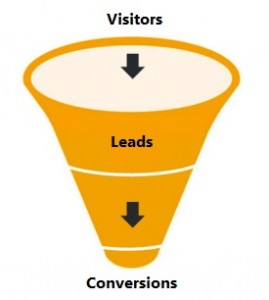The job of a search engine optimization consultant has evolved greatly over the last few years. No more is SEO just a narrowly scoped task to get clients ranked in the top 3 for their targeted keyword terms and then calling it a day.
Top rankings are nice, but that’s not the ultimate goal of the client who is paying the SEO consultant to his/her services. It’s all about return that they receive for their dollars invested in the Internet marketing campaign.
What separates the top Internet marketing companies from the mediocre ones is their understanding of how to optimize their clients’ websites not only for the search results, but also to capture more conversions (sales/leads) from visitors who land on their clients’ websites. This element of Internet marketing is known as website conversion optimization.
Varying Definitions for “Conversion”
“Conversions” can be defined in multiple ways depending on the website’s functionality and set of goals. Ecommerce websites have an easy definition for “conversion” in that if someone makes a purchase on the site, they’ve converted.
 For other lead-generating websites, a website conversion can be construed in a few different ways. For example, if you’re a realtor, getting a lead (phone call or email contact) from a prospective listing simply gets that site visitor into the realtor’s “conversion funnel.” It’s then the realtor’s job to sell themselves as the right agent for the job to the person. But the Internet marketing company can’t necessarily help in that process once the initial contact is made, so the contact itself is considered a website conversion.
For other lead-generating websites, a website conversion can be construed in a few different ways. For example, if you’re a realtor, getting a lead (phone call or email contact) from a prospective listing simply gets that site visitor into the realtor’s “conversion funnel.” It’s then the realtor’s job to sell themselves as the right agent for the job to the person. But the Internet marketing company can’t necessarily help in that process once the initial contact is made, so the contact itself is considered a website conversion.
For other websites that are more concerned with information gathering for future marketing purposes, capturing a website visitor’s name, email address and phone number would be a website conversion.
Ultimately, the goal for any business whether it be ecommerce or offline is to make a return off the investment they’ve made in Internet marketing. If your SEO company is driving traffic to your website, but you’re not receiving any sales, leads or other website conversions, then you’re not going to be receiving a return on your investment.
Optimizing Your Website for Conversions
It’s important to understand that in Internet marketing and website optimization, web design and SEO go hand in hand. There are several key elements to optimizing a website for higher conversions. Some of which deals with SEO and others that rely on an effective website design. Below are some ways in which website conversion optimization relies on each of these sides.
Conversion Optimization and Web Design
 In terms of website optimization, simply having an attractive website doesn’t guarantee a user will convert. Here are some ways that web design elements play into a user’s overall experience and ways to increase the likelihood of a conversion:
In terms of website optimization, simply having an attractive website doesn’t guarantee a user will convert. Here are some ways that web design elements play into a user’s overall experience and ways to increase the likelihood of a conversion:
- Simple, easy-to-use navigation to get the users to the information they’re looking for.
- Utilization of appealing graphics that have a strong call to action such as enewsletter signups, eBook downloads, discounts and deals, free information, etc.)
- Creation of custom landing pages for SEO-targeted keywords.
- Easy to find placement of pertinent contact information.
- Inclusion of social sharing icons on each page of the website for easy sharing amongst users.
SEO and Conversion Optimization
When it comes to SEO and its role in bolstering website conversions, there are both on-site and off-site factors that can play a significant role. Here are just a few:
On-site:
- Utilization of cross linking to other related internal pages on the website that might be of interest to a user.
- Crafting highly optimized, but balanced web copy that is well structured so it speaks to the search engines, but also convinces a user that the product or service they’re reading about is of value to them (ultimately turning them into a conversion.)
Off-site:
- Using link building and content marketing initiatives to help achieve high rankings for “conversion oriented” landing pages on the website (i.e. product landing pages on ecommerce sites, etc.)
- Promoting the website and its conversion-oriented pages in a variety of Social Media channels such as Facebook, Twitter and Google+
Feel free to leave your thoughts on SEO vs. website conversion optimization in the comments section below.


